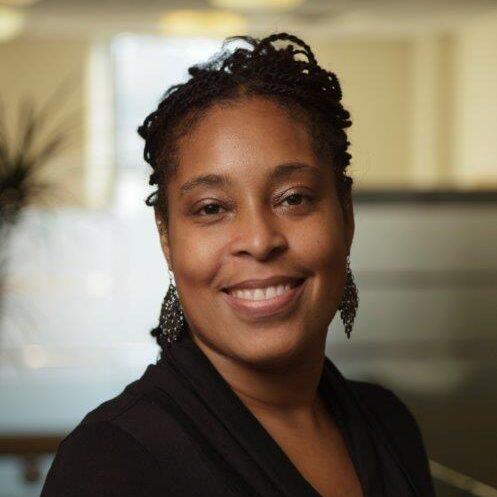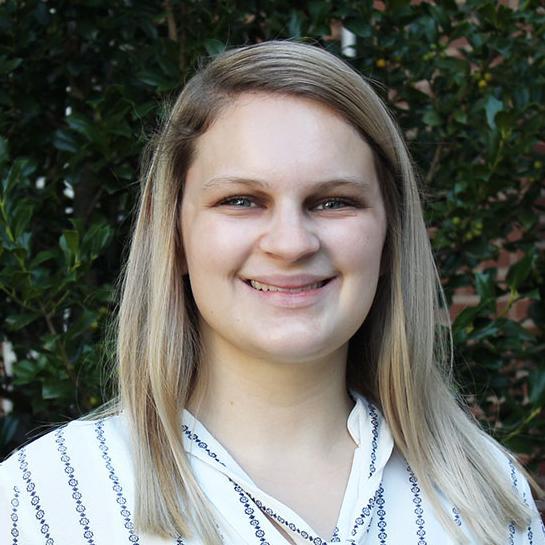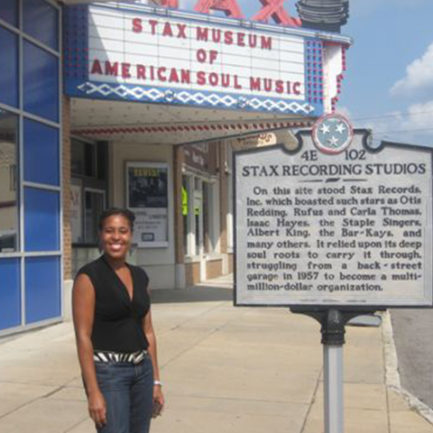April 4, 2022: This profile has been updated to more accurately describe the author’s family background.
Chrishana is a senior research scientist at Child Trends, focusing on the study and implementation of interventions to support early childhood and human service professionals in environments such as home- and community-based child care settings and Head Start. We talked with her to learn about her research, both at Child Trends and earlier in her career, and to find out more about her life outside of work.
Can you tell us about your primary research interest?
My work focuses on the intersections between research, policy, and practice in education, human service, and community-based settings. I am particularly interested in applied and participatory research. This means that I make a concerted effort in my work to ensure that what is learned can be applied to “real world” contexts, and that I include the interests, priorities, and voices of those whom my research and policy might impact when research studies are conceptualized and implemented, as well as when solutions are developed and the findings are disseminated.
What sparked your interest in intersectional applied research?
Growing up, I spent lots of time traveling around different areas of the Washington, DC, Maryland, Virginia (DMV) area: to spend time with or live with family, for social purposes, and for school. As a youngster, I recognized that there were stark differences in the living environments and educational opportunities afforded to people based on where they lived. I also noticed that these differences were closely linked to an individual or family’s color and economic status. In addition, many people (including me) were differentially treated because of these distinctions. Even at a young age I felt a sense of injustice around these issues—I always thought something was very wrong that one could have access (or lack access) to certain things based on the color of their skin or where they lived.
Do you have a favorite piece of content (book, article, podcast, etc.) that touches on your research area?
Oh boy, I can’t pick just one. I listen to podcasts when I run or walk, which are activities I do just about every day. Currently, my favorites are Code Switch, 1619, Nice White Parents, Ear Hustle, Criminal (in)Justice, and Chicano Squad. For books, I think The Sum of Us by Heather McGhee and The Color of Law by Richard Rothstein are pretty important reads.
What are your hobbies or interests outside of research?
I really love live music—R&B, rap, hip hop, blues, 1970s disco, and funk are my jams. Prince is my all-time favorite artist. If I wasn’t a researcher, I’d probably be a performing artist. I also like theater, dancing, cooking, hanging out at the beach/pool, watching my kids play soccer, and roller skating. I bought a super-duper pair of skates on a research site visit in Detroit (the roller skating culture is big there). This was right when the pandemic hit and I haven’t tried them out yet—meaning they’ve been in their box for a year and half. I won’t open the box until I feel comfortable going back to the rink; I don’t even know if they fit correctly, which is crazy given how excited I am about them.
Please share an interesting fact about yourself or your family!
On both sides of my family, I am able to trace my family history back to slavery. In fact, I have the military records of my maternal great-great-great grandfather, James Montgomery Peters; he fought for the Union in the Civil War and his musket goes on tour to museums across the country.
Henry Ivory Buck, my paternal great-great-great grandfather, was enslaved on the Upper Mill Plantation in Conway, South Carolina. He was named after his father, Henry Buck, the plantation owner and slave master. Henry Buck’s White sons (and my uncles, imagine that!) also fought in the Civil War, but for the confederacy.
My maternal great-grandfather, John Samuel Thomas Jr., worked under Jim Crow laws at the Virginia Theological Seminary in Alexandria, VA. Our family was the first to receive reparations from his labor, although the seminary will continue to make payments as it locates more living descendants of Black people who were enslaved and who worked under Jim Crow laws at the facility. The amount is minuscule, but it’s a first step in acknowledging the atrocities of slavery and costs to Black families.
So, lots of interesting family tidbits are relevant to my social justice and racial equity research leanings.
Learn More
- Chrishana's Bio
- Reimagining Black Families’ Cultural Assets Can Inform Policies and Practices That Enhance Their Well-being
- Racism and Discrimination Contribute to Housing Instability for Black Families During the Pandemic
- Federal Policies Can Address the Impact of Structural Racism on Black Families’ Access to Early Care and Education
- Family, Economic, and Geographic Characteristics of Black Families with Children
- Applying Indicators and Theory to the Delivery of Early Care and Education Supports for Black Families with Infants and Toddlers
- http://Anti-racist policymaking to protect, promote, and preserve Black families and babies
© Copyright 2025 ChildTrendsPrivacy Statement
Newsletter SignupLinkedInYouTubeBlueskyInstagram

